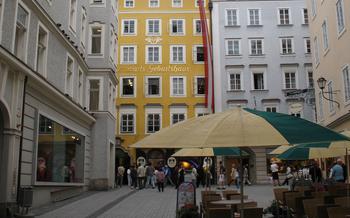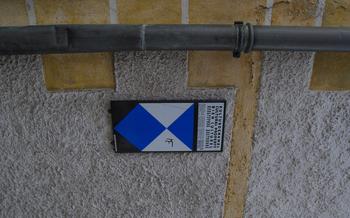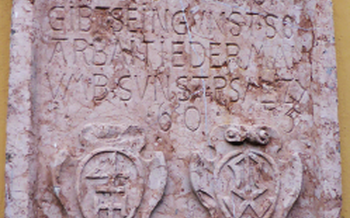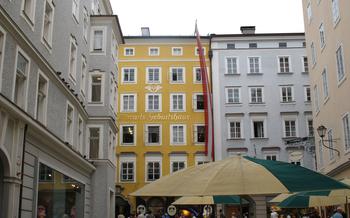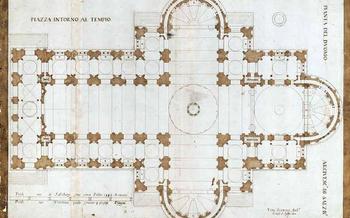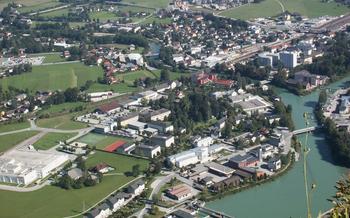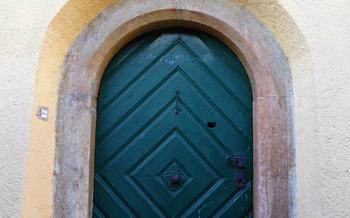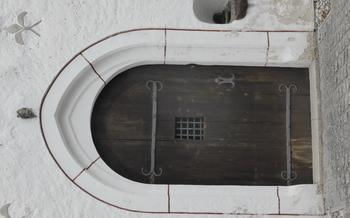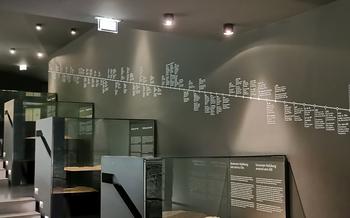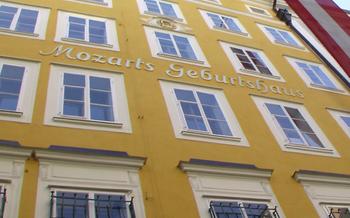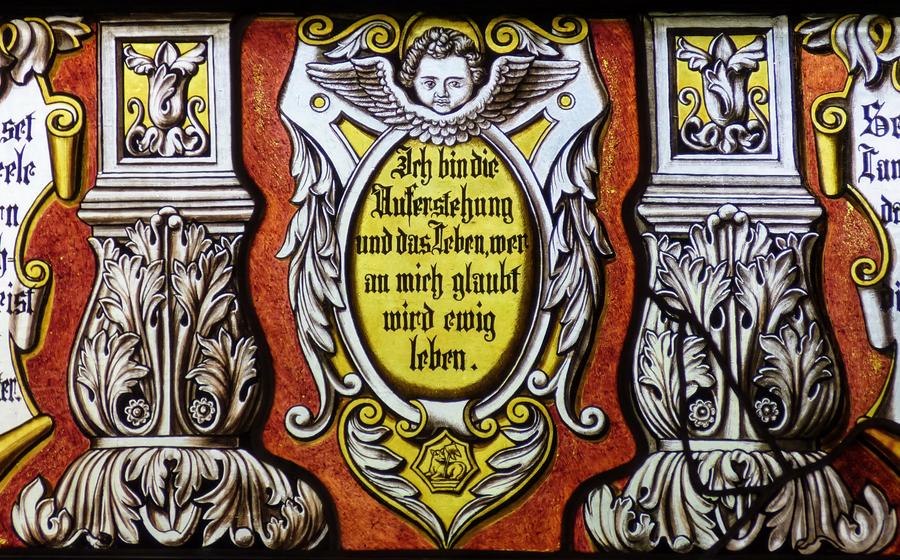
Mozart's Residence
- Mozart's Birthplace
- Guided Tours
- Interactive Exhibits
- Mozart's Family
- Historical Context
- Music Performances
- Mozart's Legacy
- Nearby Attractions
- Practical Information
- Photography and Videography
- Souvenirs and Merchandise
- Educational Programs
- Accessibility
- Research and Scholarship
- Insider Tip
Mozart's Birthplace
In the heart of Salzburg, nestled amidst charming cobblestone streets and baroque architecture, lies the birthplace of Wolfgang Amadeus Mozart, one of the most celebrated composers in history. This iconic building, located at Getreidegasse 9, holds immense historical significance as the place where Mozart was born on January 27, 175The birthplace has undergone meticulous preservation efforts to maintain its original 18th-century charm, offering visitors a glimpse into the early life of this musical prodigy.
The birthplace features an array of exhibits and artifacts that showcase Mozart's childhood and family life. Visitors can explore the rooms where Mozart lived and worked, marveling at his early compositions and personal belongings. Guided tours provide fascinating insights into Mozart's formative years, shedding light on his musical genius and the nurturing environment that shaped his talent.
Guided Tours
Enrich your visit to Mozart's Birthplace with a guided tour, available in various languages. Knowledgeable and passionate guides will lead you through the museum's exhibits, sharing insights into Mozart's life, family, and musical achievements. These tours typically last for about an hour and provide a comprehensive overview of the museum's highlights. Advance booking is recommended, especially during peak tourist season, to ensure your spot on a tour.
Interactive Exhibits
Mozart's Birthplace offers a range of interactive exhibits that bring the composer's life and music to life for visitors of all ages. These engaging displays allow you to explore Mozart's compositions in a hands-on and immersive way.
One of the highlights is the interactive music station, where you can compose your own melodies using a variety of instruments and sounds. This is a great way to experiment with different musical elements and create your own unique compositions.
Another popular exhibit is the virtual reality experience, which takes you on a journey through Mozart's childhood home. You can explore the rooms where he lived and worked, and even see him perform on his beloved fortepiano.
For those who want to learn more about Mozart's music, there are a number of multimedia displays that provide in-depth information about his compositions, techniques, and influences. You can listen to recordings of his most famous works, watch videos of performances, and read about the historical context of his music.
Whether you're a seasoned musician or a casual music lover, the interactive exhibits at Mozart's Birthplace offer a fun and educational way to engage with his life and work.
Mozart's Family
Wolfgang Amadeus Mozart's family played a pivotal role in his musical development and early success. His father, Leopold Mozart, was a renowned violinist and composer who recognized Wolfgang's extraordinary talent at an early age. He became Wolfgang's first teacher, providing him with rigorous training in music theory, composition, and performance. Leopold's dedication and expertise laid the foundation for Wolfgang's musical genius.
Maria Anna Mozart, Wolfgang's mother, was a loving and supportive figure in his life. Although she did not possess formal musical training, she shared her husband's passion for music and encouraged Wolfgang's pursuit of his artistic endeavors. Maria Anna's unwavering belief in her son's abilities contributed to his self-confidence and determination to succeed.
Wolfgang's older sister, Maria Anna ("Nannerl"), was also a talented musician. She received music lessons from her father alongside Wolfgang and displayed considerable skill in playing the keyboard. Nannerl often performed alongside her brother, and her musical abilities contributed to the family's reputation as a musical prodigy.
The Mozart family was close-knit and supportive, with each member playing a unique role in Wolfgang's musical education and career. Their dedication, expertise, and love helped shape Wolfgang into one of the greatest composers in history.
Anecdotes and stories abound about Mozart's childhood and family life. One famous anecdote tells of a young Wolfgang composing a minuet at the age of five, which his father transcribed and sent to a publisher. Another story recounts how Wolfgang and Nannerl performed for Empress Maria Theresa of Austria at the Schönbrunn Palace in Vienna, where the young Mozart reportedly climbed into the Empress's lap and kissed her. These anecdotes provide a glimpse into the close relationship between Wolfgang and his family, as well as the extraordinary talent that he displayed from a young age.
Historical Context
Mozart's life and career were deeply intertwined with the cultural and historical context of 18th-century Salzburg. The city was a thriving center of music and the arts, and Mozart's father, Leopold, was a renowned violinist and composer who served as the court composer to the Archbishop of Salzburg. This privileged position allowed Mozart to access the finest musical education and training, and he quickly emerged as a child prodigy.
Salzburg was also a major center of the Catholic Church, and Mozart's music was heavily influenced by the religious traditions of the time. Many of his compositions were written for the church, including masses, vespers, and other liturgical works.
Mozart's Contemporaries
Mozart was not the only musical genius to emerge from 18th-century Salzburg. His contemporaries included Michael Haydn, the younger brother of the renowned composer Joseph Haydn, and Anton Stadler, a virtuoso clarinetist who premiered many of Mozart's clarinet concertos. These musicians were part of a vibrant musical community that fostered creativity and innovation.
Social and Political Influences
Mozart's life was also shaped by the social and political upheavals of the late 18th century. The French Revolution, which began in 1789, had a profound impact on Europe, and Mozart's music reflected the changing political and social landscape. His operas, such as "The Marriage of Figaro" and "Don Giovanni," explored themes of social class and political intrigue, and his music became increasingly infused with a sense of drama and urgency.
Comparison with Other Notable Composers
Mozart's genius as a composer is often compared to that of other great masters of the classical era, such as Haydn, Beethoven, and Bach. Each of these composers made significant contributions to the development of Western music, and their works continue to be performed and admired around the world.
However, Mozart's music stands out for its unique blend of melody, harmony, and emotional depth. His compositions are characterized by their grace, elegance, and wit, and they have been described as "perfect" by many music critics and scholars.
Music Performances
Mozart's music lives on beyond the walls of his birthplace, enchanting audiences around the world. In Salzburg, you have the privilege of experiencing his compositions brought to life by talented musicians. Attend a concert at the venerable Salzburg Festival, renowned for its world-class performances, where you can immerse yourself in the melodies that defined an era.
Collaborate with local musicians and ensembles to arrange a private recital or chamber concert, creating an intimate and unforgettable musical encounter. Explore the city's many concert halls and churches, each with its unique acoustics and ambiance, hosting regular performances of Mozart's works.
Don't miss the Salzburg Mozart Week, an annual festival dedicated entirely to the maestro's legacy. This prestigious event features a plethora of concerts, recitals, and operas, attracting music enthusiasts from far and wide. Book your tickets in advance to secure your seat at these sought-after performances.
Whether you prefer the grandeur of an orchestra or the intimacy of a solo recital, Salzburg offers a diverse range of musical experiences that will transport you to the time of Mozart, allowing you to appreciate his genius in its purest form.
Mozart's Legacy
Wolfgang Amadeus Mozart's music transcended his time and left an indelible mark on the world of classical music. His compositions, characterized by their melodic beauty, harmonic complexity, and emotional depth, continue to captivate audiences centuries after his death. Mozart's legacy extends far beyond the concert hall, influencing subsequent generations of composers and shaping the development of Western music.
His works, such as the opera "The Magic Flute" and the "Requiem," are regarded as masterpieces of the classical repertoire and are regularly performed by orchestras and ensembles worldwide. Mozart's music has also found its way into popular culture, with his compositions appearing in films, television shows, and advertisements. His influence can be heard in the works of later composers, including Beethoven, Schubert, and Brahms, who drew inspiration from his innovative and expressive style. Mozart's music continues to be studied, analyzed, and performed, ensuring that his legacy will endure for generations to come.
Nearby Attractions
Beyond Mozart's Birthplace, Salzburg offers a wealth of other cultural and historical attractions. Take a leisurely walk through the enchanting streets of the Altstadt (Old Town), a UNESCO World Heritage Site, and admire its beautifully preserved Baroque architecture. Visit the Salzburg Cathedral, where Mozart was baptized, and climb to the top of the Festung Hohensalzburg, a 11th-century fortress, for breathtaking panoramic views of the city and the surrounding Alps.
For art enthusiasts, the Salzburg Museum and the Museum der Moderne offer diverse collections of paintings, sculptures, and contemporary art. The Mirabell Palace and Gardens, with its stunning fountains and manicured lawns, provide a serene oasis in the heart of the city. Music lovers can delve deeper into Mozart's legacy at the Mozarteum, a museum dedicated to his life and works, or attend a concert at the Salzburg Festival, one of the most prestigious classical music events in the world.
Venture beyond the city center to explore the surrounding countryside. Take a boat trip on the Salzach River, hike through the picturesque Hellbrunn Palace Gardens, or visit the Eisriesenwelt, the largest ice cave in the world. With its rich history, stunning landscapes, and vibrant cultural scene, Salzburg offers an unforgettable experience for every traveler.
Practical Information
To make the most of your visit to Mozart's Birthplace, it's essential to plan and be prepared. The museum's opening hours vary depending on the time of year, so it's best to check in advance. Admission fees are reasonable, and there are discounts for students, seniors, and groups. Online ticketing options are available for convenience and to avoid long queues.
For those with disabilities, the museum is fully accessible, with ramps, elevators, and accessible restrooms. Visitors can also request audio guides in multiple languages for a more immersive experience. To avoid the crowds and ensure a more relaxed visit, consider visiting during the off-season or on weekdays. However, if you're visiting during peak tourist season, be prepared for larger crowds and plan accordingly.
Photography and Videography
Capturing the essence of Mozart's Birthplace through photography and videography is an excellent way to preserve memories and share the experience with others. However, it is essential to respect the privacy of other visitors and maintain decorum while documenting your visit.
Guidelines for Photography and Videography:
- Flash Photography: Flash photography is not permitted inside the museum to protect delicate artifacts and artwork.
- Tripods and Selfie Sticks: The use of tripods and selfie sticks is generally not allowed due to space constraints and safety considerations.
- Video Recording: While video recording is permitted, it should be done discreetly and without disturbing other visitors.
- Respecting Privacy: Avoid capturing images or videos of other visitors without their consent.
- Social Media Sharing: When sharing photos or videos on social media, be mindful of privacy settings and tag the museum's official accounts.
Tips for Capturing Memorable Moments:
- Composition: Pay attention to composition and lighting to create visually appealing photographs.
- Details: Capture close-ups of artifacts, exhibits, and architectural features to showcase the museum's unique details.
- Natural Light: Take advantage of natural light streaming through the windows for beautiful, well-lit shots.
- Storytelling: Create a narrative through your images and videos to convey the museum's history and atmosphere.
- Share Your Experience: Share your photos and videos with friends, family, and fellow music enthusiasts online, using relevant hashtags.
Souvenirs and Merchandise
Mozart's Birthplace offers a delightful array of souvenirs and merchandise for music enthusiasts and Mozart fans. The museum shop is a treasure trove of unique gifts and keepsakes, including replicas of Mozart's instruments, sheet music, and personal belongings. Visitors can find a variety of Mozart-themed items, such as t-shirts, mugs, magnets, and postcards, to commemorate their visit and share their love for the composer.
For those seeking more exclusive souvenirs, the museum shop also offers a selection of limited-edition items and collector's pieces. These include high-quality prints of Mozart's portraits, reproductions of his handwritten manuscripts, and even miniature replicas of his childhood home. These special items are perfect for serious Mozart aficionados and collectors who want to own a piece of history.
When shopping for souvenirs at Mozart's Birthplace, it is important to keep an eye out for official merchandise and memorabilia. These items are typically marked with the museum's logo or a seal of authenticity. By purchasing official merchandise, visitors can support the museum's efforts to preserve and promote Mozart's legacy.
To avoid tourist traps and find the best souvenirs, it is advisable to do some research before your visit. Read reviews and recommendations online, and consider purchasing souvenirs from reputable sources such as the museum shop or authorized retailers. By carefully selecting your souvenirs, you can ensure that you bring home meaningful mementos of your visit to Mozart's Birthplace.
Educational Programs
Mozart's Birthplace offers a range of educational programs designed to engage students and groups in the life and music of Wolfgang Amadeus Mozart. These programs aim to foster an appreciation for classical music, promote creativity, and inspire future generations of musicians and music enthusiasts.
Workshops, lectures, and interactive activities are tailored to different age groups and levels of musical knowledge. School groups can organize field trips to the museum to enhance their music education kurikulum and provide a hands-on learning experience.
Collaborations with music educators and institutions ensure that the programs align with educational standards and curriculum requirements. Resources and materials are provided to teachers to facilitate their lesson plans and help students delve deeper into Mozart's music and its historical context.
Insider Tip: Attend the "Mozart for Kids" workshop, where children can learn about Mozart's life and music through interactive storytelling, games, and hands-on activities. This workshop is a fun and educational way for kids to engage with Mozart's legacy.
Accessibility
Mozart's Birthplace is committed to providing an inclusive and accessible experience for all visitors. Wheelchair users and individuals with mobility challenges can easily navigate the museum with ramps and elevators available throughout the building. Accessible restrooms are also provided for convenience. Visitors with visual or hearing impairments can request assistance from the friendly museum staff, who are always ready to provide guidance and support. Detailed maps and materials in alternative formats are available upon request to enhance the experience for all. Whether you have specific accessibility needs or simply require assistance, the museum staff is dedicated to ensuring a comfortable and enjoyable visit for everyone.
Research and Scholarship
Mozart's Birthplace is not just a museum; it is also a hub for research and scholarship. The Mozart Research Center, located within the museum, houses a vast collection of historical documents, manuscripts, and research materials related to Mozart's life and work. Scholars and researchers from around the world visit the center to study these materials and contribute to the ongoing exploration of Mozart's legacy. The center also collaborates with universities and institutions to support academic projects and promote Mozart's music. If you are a researcher, student, or music enthusiast interested in delving deeper into Mozart's life and work, the Mozart Research Center is an invaluable resource. You can access the center's collection, participate in lectures and workshops, and collaborate with other scholars to advance the understanding of Mozart's music and its impact on the world.
Insider Tip
Beyond the main exhibits and attractions, there are secret spots and hidden gems within Mozart's Birthplace that may be overlooked by visitors. For a truly immersive experience, explore the less-known corners of the museum, such as the hidden courtyard where Mozart's father, Leopold, composed some of his own works. Another secret spot is the small music room where Mozart's sister, Nannerl, practiced her piano playing.
To get the most out of your visit, attend special events or concerts held at Mozart's Birthplace. These events often feature performances of Mozart's music by local musicians and ensembles, creating a unique and intimate atmosphere.
For an authentic Austrian culinary experience, venture beyond the tourist traps and explore the local restaurants and cafes in the vicinity of Mozart's Birthplace. Sample traditional Austrian dishes such as Salzburger Nockerl, a sweet soufflé-like dessert, or Tafelspitz, a boiled beef dish served with horseradish sauce.
Embrace the local culture by attending one of the many festivals and events held in Salzburg throughout the year. These festivals offer a glimpse into the city's rich history and traditions, with performances, parades, and traditional Austrian cuisine.
By exploring the hidden gems, attending special events, and immersing yourself in the local culture, you'll gain a deeper understanding and appreciation for Mozart's life and legacy, and create lasting memories of your visit to Salzburg.
